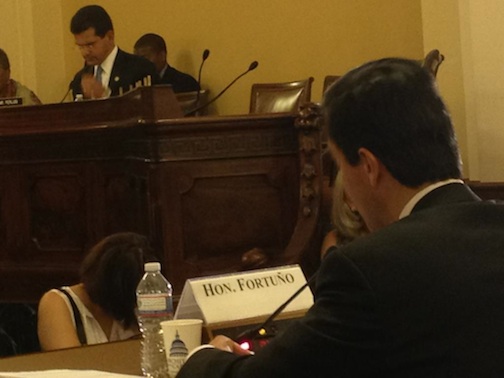Above: Puerto Rico Governor Luis Fortuño at the hearing in Washington
By the Caribbean Journal staff
Puerto Rico Governor Luis Fortuño is calling on US President Barack Obama and federal law enforcement officials to establish a US Caribbean Border Initiative to combat the growing problem of drug-related crime in Puerto Rico and the US Virgin Islands.
Fortuño testified Thursday at a hearing of the US Congress’ Subcommittee on Oversight, Investigations and Management concerning drug trafficking the US-Caribbean border.
“Right now, Puerto Rico is serving on the front lines,” Fortuño said. “We need help fighting this battle along the Caribbean border, to protect the US citizens there being buffeted by violence and to precent the fight from spreading further onto the streets of the US mainland.”
According to the governor, drug trafficking cartels operating from Colombia and through transit countries like Venezuela and the Dominican Republic are sparking a battle for drug turf in Puerto Rico.
“The US Caribbean territories of Puerto Rico and the US Virgin Islands are America’s Caribbean border,” Fortuño said. “Because of their geographic proximity to drug-producing and drug transiting countries in South America and the Caribbean, notably Colombia, Venezuela and the Dominican Republic, the US Caribbean Border is increasingly being used as a transshipment zone, primarily for cocaine, but also heroin, destined for mainland US markets.”
Some of these traffickers, he said, have ties to Colombia’s FARC.
The governor pointed to a Drug Enforcement Administration operation that dismantled a distribution chain that moved close to 4,000 kilos of cocaine from Guatemala, Honduras, Ecuador, Colombia, Venezuela, Tortola, Antigua and the British Virgin Islands to Puerto Rico.
As part of their operation, Fortuño said, the network had an agreement with the 10th division of FARC where they received $1,000 for every kilo of cocaine that was transported to the Valle de Apure in Venezuela.
Once the cocaine was on Venezuelan soil, the group would ship it to waters close to Tortola, BVI and Antigua, where the drugs were picked up by ships bound for Puerto Rico.
An estimated 70 to 80 percent of Colombian cocaine reaching Puerto Rico is then transshipped to US cities across the eastern seabird, from Florida to New York, according to law enforcement authorities.
“Nearly 30 percent of the illegal drugs coming into the continental United States come through the Caribbean, making us as important a border from a defensive standpoint as the US-Mexico border,” Fortuño said.
Indeed, much of the pressure aimed at securing the US-Mexico border has led to traffickers increasingly using routes through the Caribbean, he said.
But the federal government seems to be neglecting its Caribbean territories, according to Fortuño; Puerto Rico and the USVI are not included in several statistical surveys on drugs and drug control, he said.
“It appears that federal officials in Washington are selectively including us when it benefits them while excluding us when it tarnishes any national statistics,” he said.
Narco-trafficking has a led to a murder rate in Puerto Rico that is six times the national average; an estimated 80 percent of murders in the territory are tied to the illegal drug trade.
“The limited attention and leadership from Washington’s federal law enforcement agencies suggests that Puerto Rico and USVI are lower priorities,” he said. “This lack of sufficient attention is most blatantly evidenced by the absence of any kind of comprehensive interagency strategy by the federal government to counteract the drug violence and national security threats these criminal networks generate along the US Caribbean border.”
The hearing was chaired by Texas Congressman Michael McCaul.
